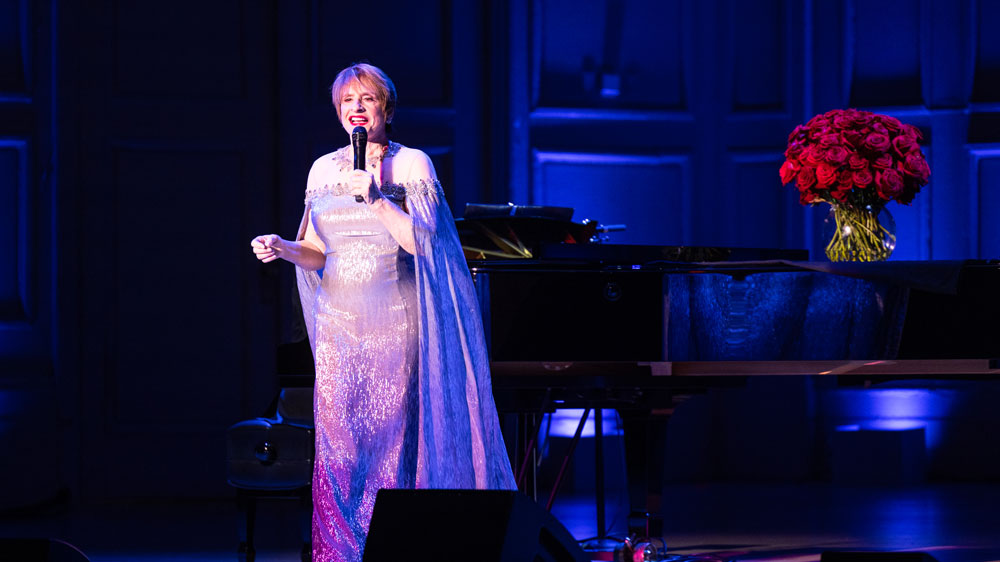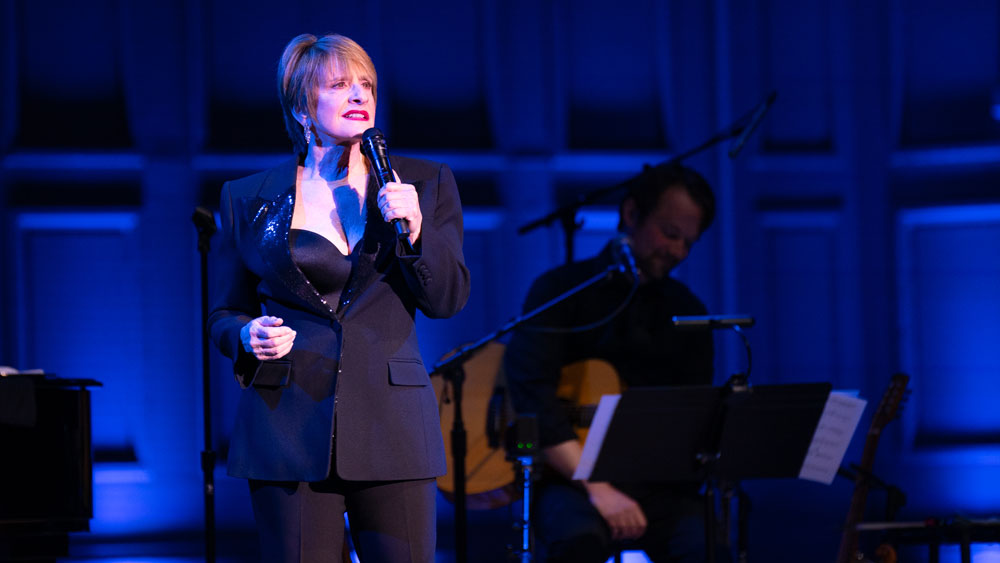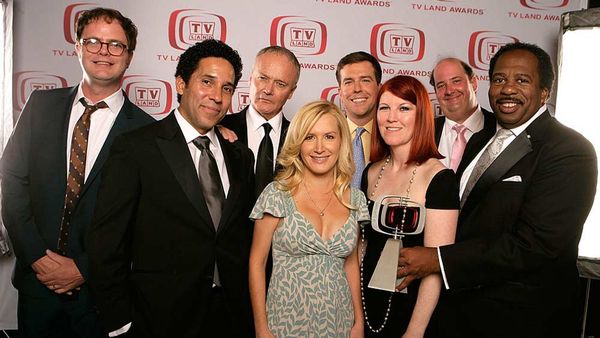Apr 10
EDGE ShortCuts: Patti LuPone Rules, a Triumphant 'Company,' and Anthony Rapp Touches the Heart
Robert Nesti READ TIME: 9 MIN.

Editor's note: "EDGE ShortCuts" will be a column that covers Boston cultural events.

Source: Robert Torres/Celebrity Series of Boston
Patti LuPone — "A Life In Notes"
At the onset of "A Life in Notes," Patti LuPone covered the 1963 hit "On Broadway," and when she sang the lyric, "They say I won't last too long on Broadway," she punctuated it with "HA!." And why not? Of all theater stars, LuPone has the permission to cackle such a line. With a five-decade career, three Tony awards, two Olivier awards, and high-profile roles she introduced in numerous musicals hits, LuPone continues to have lasting power, as her recent appearance (at Boston's Symphony Hall sponsored by the Celebrity Series of Boston) gave ample proof.
LuPone is touring "A Life in Notes" to concert halls this Spring, but this tightly conceived and resonant evening is prime for Broadway if she wanted to take up residence there with it. Early on, she confessed that she wrote a memoir 15 years ago, but has more to tell, and she chose to do so in a uniquely personal way by curating her set with songs that had special meanings to her at different times in her life. As a child and teenager, it was the lure of pop music that captured her imagination, and the first part of her evening was dedicated to sleek arrangements of such titles as Rosemary Clooney's "Come On-A My House," "Ebb Tide," the Shangri-Las' "Dressed in Black," "Teen Angel," and a powerfully angsty "Town Without Pity." Best of all were the tight harmonies LuPone and her accompanists Joseph Thalken (arrangements and piano) and Brad Phillips, (acoustic guitar and mandolin) brought to "Summertime," the earwormy Jamies hit from 1958.

Source: Robert Torres/Celebrity Series of Boston
Of course there were nods to her musical theater career that she covered in a suite of three songs: "Don't Cry for Me, Argentina" ("Evita"), "I Dreamed a Dream" ("Les Miserables"), and "The Ladies Who Lunch" ("Company"), each of which brought her a standing ovation from some. But she also used Broadway songs to relate to her personal story, which made "Some People," Rose's brassy paean to freedom from "Gypsy" (a role that won LuPone her second Tony), an expression of her frustration with living in childhood home on Long Island and moving to New York.
LuPone describes herself as an actor who sings – a term, by the way, that brings to mind what Stephen Sondheim has said about what he expects from performers in his musicals. Her firm mezzo shows little sign of wear, and when melded with her acting skills brought to mind the late Barbara Cook in the ability to turn each song into a one-act play. Her reading of "I Wish It So," the plaintiff song from the little-known musical "Juno," exquisitely captured both the deep yearning of its words and the soaring lyricism of Marc Blitzstein's melody. Another unearthed treasure was "Lilac Wine," another 1950s pop song (introduced by Eartha Kitt, but covered by other artists, including Jeff Buckley in the 1970s). The context was LuPone's first encounter with marijuana that she introduced with an observation that captured her flip sense of humor: "I first heard this in a haze of marijuana smoke in a Manhattan apartment that looked like a Bombay bordello, I was 19. I was falling for a 28-year-old." But things don't go well romantically, as the song lyric, and LuPone's plaintiff reading of it, suggests.
She also gave a nod to Judy Garland – the 20th century greatest concert performer – by taking on her iconic "The Man That Got Away," which was lovingly rendered with show-stopping snap. In the second half, she touched upon the madness and tragedy of the 1980s with two Cole Porter songs: "Anything Goes" (which referenced her starring in a successful revival), followed by a poignant "Every Time We Say Goodbye," in memory of those who passed from AIDS.
LuPone was dressed every inch the diva: in the first half, it was a tightly fitting, black suit with a plunging neckline; the second half was a shimmering white gown with a cape that flowed behind her at times. In her mid-70s LuPone shows no signs of slowing down, though she has said she will not return to Broadway in another musical. With this splendid show ready for prime time, may she reconsider?
"Patti LuPone: A Life in Notes" presented by the Celebrity Series of Boston, Symphony Hall, Boston, April 2, 2024. For more on the Celebrity Series' upcoming events, follow this link.
LuPone's tour continues through May 19. For more information, visit her website.

Source: Michael Murphy
"Company" (National Tour)
Can a 50-year-old musical about marriage and interpersonal relationships resonate in 2024? In the case of Stephen Sondheim and George Furth's "Company," the answer is a resounding yes in British director Marianne Elliott's gender-swapping concept in which bachelor Bobby becomes bachelorette Bobbie. Far from a gimmick, this approach makes the show fresh again. In fact, it may leave you thinking it the definitive version of this Sondheim classic.
"Company" has always been unusual even amongst Sondheim shows. Lacking a conventional narrative, it unfolds in a series of unrelated scenes of Bobbie socializing with her married friends. At the onset they gather in Bobbie's cramped apartment to give her a surprise birthday party, followed by their usual complaint that she should be married. At first, she ignores them, but perhaps it is those helium balloons reading "35" that get under her skin, because she becomes more and more troubled by her marital status. Not that she's alone – a trio of himbos keep her dating life occupied; one even wants to marry her, but she feels something is missing.
What makes this "Company" so smart and compelling is the way Elliott conceives the show as something of a "Black Mirror" episode in which Bobbie gets locked in an increasingly bizarre nightmare. At one point the couples gather to celebrate her third-wheel status in their lives ("Side by Side"), only to have the number dissolve into mayhem. Not long after in a superb bit of movement (kudos to choreographer Liam Steel), Bobbie sleeps with Andy (Jacob Dickey, hilarious), her dimmest beau, and has a bizarre dream in which she is caught in a surreal "Groundhog Day" of sorts that expresses her deep-rooted fears of marriage doldrums. With these intrusions, Elliott makes it plain that this isn't Harold Prince's "Company" anymore – the slick 1970s gloss given that initial production becomes something more tangibly real.
"Company" has long been an ensemble show and the current nationally touring one couldn't be better. Britney Coleman excels as Bobbie, mixing both confidence and insecurity in equal measure as her personal crisis unfolds, and knocking her two major solos out of the park – "Marry Me a Little," the first act closer that was subsequently added to the show over the years; and "Being Alive," bringing to it a deeply touching urgency. In the showiest role, Judy McLane is on-target as the steely Joanne, and she soared with "The Ladies Who Lunch," her bitter tirade on the East Side's Real Housewives. Also standing out is Tyler Hardwick, who does a letter-perfect reading of the tricky "Another Hundred People," and is quite funny as Bobbie's alt-boyfriend. And, best of all, Matt Rodin, whose tongue-twisting "Not Getting Married Today" brilliantly captures a young groom in serious need of an Adderall. The scene has a piercing authenticity – given that same-sex marriage is a concept that was unheard of when "Company" was first produced – which frames the show's meandering narrative, refocusing the musical's primary concerns about being single or not.
Throughout the production, Elliott has tweaked Furth's book for the better, making it contemporary without losing any of its intent. Her vision of Bobbie's world is also enhanced by Bunny Christie's set design, a series of rooms framed as boxes that move about the stage that suggest how constricting urban life has become in the 21st century, reinforcing how the walls are (literally) closing in on Bobbie. Her designs sit in contrast to Boris Aronson's original unit that suggested New York City as one big playground; here it is more confining. Neil Austin's lighting also plays into Elliott's darker concept, using darkness to great effect to underscore how frightening Bobbie's journey has become. Of course, there are Sondheim's songs, seamlessly reorchestrated by David Cullen, that recall how this work introduced many to his phenomenal talent. It remains phenomenal after all these years.
"Company" continues through April 14 at the Citizen Bank Opera House, 539 Washington Street, Boston, MA. Sponsored by Broadway in Boston. For more information about the Boston run, follow this link.

Source: Russ Rowland
Anthony Rapp — "Without You"
As its title implies, "Without You" is about loss – in this case the tragic death of Jonathan Larson who died abruptly after watching an early preview of his musical "Rent" as told by a first-hand observer, Anthony Rapp. That was 28 years ago when Rapp was an unemployed actor (a Starbucks barista) who connected immediately with Larson when he auditioned for a workshop production of the musical at the New York Theatre Workshop. He sang R.E.M.'s "Losing My Religion" and Larson told him he liked him in "Dazed and Confused." They became close, with Larson attending Rapp's 23rd birthday party and boasting that he was the future of the musical theater. That claim, sadly, never reached fruition; but "Rent" and the off-Broadway musical "tick.. tick Boom!" offer ample proof that Larson may have been correct in his self-assessment.
Rapp wrote about his experiences in the musical, in which he played Mark, the videographer, in the book "Without You: A Memoir of Love, Loss, and the Musical 'Rent,'" which came out in 2006. In 2008 Rapp turned the book into a solo piece that returns to Boston at the Calderwood Pavilion (through April 14) sponsored by ATG Colonial (for ticket information, follow this link.)
Smoothly directed by Steven Maler (Artistic Director of Boston's Commonwealth Shakespeare Company), "Without You" turns out to be more than Rapp's engaging commentary on "Rent's" roots; it also follows his tender relationship with his mom as she battled cancer. She's something of an EveryMom, supporting her son throughout his acting career (which began at an early age), but wondering why he had continually played oddball characters. She's aware of him being gay (he came out to her at 18) but not quite able to deal with the information.
Rapp adopts a higher-pitched voice and Midwestern accent (he grew up outside of Chicago) to portray his mom, as well as a deeper one for Larson, but for the most part he engagingly speaks and sings in the first person. Accompanied by a tight band (the musical direction and orchestration by Daniel A. Weiss with additional orchestration by Tom Kitt), he sings a number of the better-known "Rent" songs, as well as some original pop/rock songs he wrote (in collaboration with David Matos and Joe Pisapia) that center on his emotional journey. His journalistic account, replete with photos projected on the large screen (projections by David Bengali), is remarkably detailed with one of the best sequences chronicling how the "Rent" cast sang "Seasons of Love" at the first rehearsal. Rapp's voice wavered a bit throughout but remains a powerful instrument in this deeply personal and affecting account of living through loss.
"Without You" continues through April 14 at the Calderwood Pavilion, 527 Tremont Street, Boston, MA. For more information, follow this link.
Robert Nesti can be reached at [email protected].




